

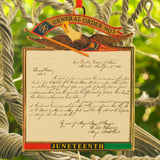
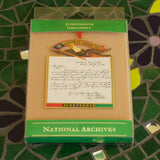



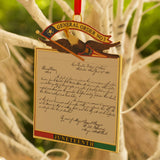


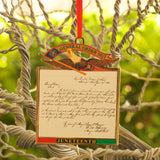
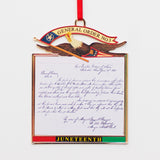
Juneteenth Ornament
- National Archives Store Exclusive
- Made in the U.S.A.
- Solid brass, electroplated with non-tarnishing silver finish, giclee print
- 2 ½ X 3 inches
- Gift boxed
-
Exclusive to the National Archives Store, this detailed and vividly colored ornament was made in the United States. It depicts the handwritten record of General Order No. 3 which on June 19, 1865, announced to the people of Texas that all enslaved people were now free. This wonderful and distinguished decorative piece deserves to be shown at any time of year.
-
On June 19, 1865, two and a half years after President Abraham Lincoln’s historic Emancipation Proclamation, U.S. Maj. Gen. Gordon Granger issued General Order No. 3, which informed the people of Texas that all enslaved people were now free. Granger commanded the Headquarters District of Texas, and his troops had arrived in Galveston the previous day.
This day has come to be known as Juneteenth, a combination of June and 19th. It is also called Freedom Day or Emancipation Day, and it is the oldest known celebration commemorating the end of slavery in the United States.
The official handwritten record of General Order No. 3, is preserved at the National Archives Building in Washington, D.C.
General Order No. 3 states:
“The people of Texas are informed that, in accordance with a proclamation from the Executive of the United States, all slaves are free. This involves an absolute equality of personal rights and rights of property between former masters and slaves, and the connection heretofore existing between them becomes that between employer and hired labor. The freedmen are advised to remain quietly at their present homes and work for wages. They are informed that they will not be allowed to collect at military posts and that they will not be supported in idleness either there or elsewhere.”